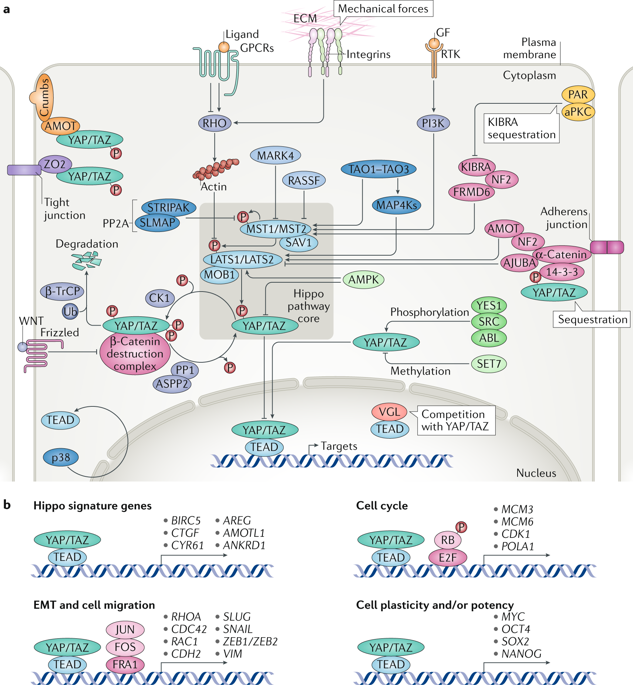当前位置:
X-MOL 学术
›
Nat. Rev. Mol. Cell Biol.
›
论文详情
Our official English website, www.x-mol.net, welcomes your
feedback! (Note: you will need to create a separate account there.)
Hippo-YAP/TAZ signalling in organ regeneration and regenerative medicine.
Nature Reviews Molecular Cell Biology ( IF 81.3 ) Pub Date : 2019-04-01 , DOI: 10.1038/s41580-018-0086-y Iván M Moya 1, 2 , Georg Halder 2
Nature Reviews Molecular Cell Biology ( IF 81.3 ) Pub Date : 2019-04-01 , DOI: 10.1038/s41580-018-0086-y Iván M Moya 1, 2 , Georg Halder 2
Affiliation

|
The Hippo pathway and its downstream effectors, the transcriptional co-activators Yes-associated protein (YAP) and transcriptional co-activator with PDZ-binding motif (TAZ), regulate organ growth and cell plasticity during animal development and regeneration. Remarkably, experimental activation of YAP/TAZ in the mouse can promote regeneration in organs with poor or compromised regenerative capacity, such as the adult heart and the liver and intestine of old or diseased mice. However, therapeutic YAP/TAZ activation may cause serious side effects. Most notably, YAP/TAZ are hyperactivated in human cancers, and prolonged activation of YAP/TAZ triggers cancer development in mice. Thus, can the power of YAP/TAZ to promote regeneration be harnessed in a safe way? Here, we review the role of Hippo signalling in animal regeneration, examine the promises and risks of YAP/TAZ activation for regenerative medicine and discuss strategies to activate YAP/TAZ for regenerative therapy while minimizing adverse side effects.
中文翻译:

器官再生和再生医学中的 Hippo-YAP/TAZ 信号传导。
Hippo 通路及其下游效应子、转录共激活因子 Yes 相关蛋白 (YAP) 和具有 PDZ 结合基序 (TAZ) 的转录共激活因子在动物发育和再生过程中调节器官生长和细胞可塑性。值得注意的是,小鼠体内 YAP/TAZ 的实验性激活可以促进再生能力较差或受损的器官的再生,例如成年心脏以及老年或患病小鼠的肝脏和肠道。然而,治疗性 YAP/TAZ 激活可能会导致严重的副作用。最值得注意的是,YAP/TAZ 在人类癌症中被过度激活,而 YAP/TAZ 的长时间激活会触发小鼠的癌症发展。因此,能否以安全的方式利用 YAP/TAZ 促进再生的力量?在这里,我们回顾了河马信号在动物再生中的作用,
更新日期:2019-05-16
中文翻译:

器官再生和再生医学中的 Hippo-YAP/TAZ 信号传导。
Hippo 通路及其下游效应子、转录共激活因子 Yes 相关蛋白 (YAP) 和具有 PDZ 结合基序 (TAZ) 的转录共激活因子在动物发育和再生过程中调节器官生长和细胞可塑性。值得注意的是,小鼠体内 YAP/TAZ 的实验性激活可以促进再生能力较差或受损的器官的再生,例如成年心脏以及老年或患病小鼠的肝脏和肠道。然而,治疗性 YAP/TAZ 激活可能会导致严重的副作用。最值得注意的是,YAP/TAZ 在人类癌症中被过度激活,而 YAP/TAZ 的长时间激活会触发小鼠的癌症发展。因此,能否以安全的方式利用 YAP/TAZ 促进再生的力量?在这里,我们回顾了河马信号在动物再生中的作用,




















































 京公网安备 11010802027423号
京公网安备 11010802027423号